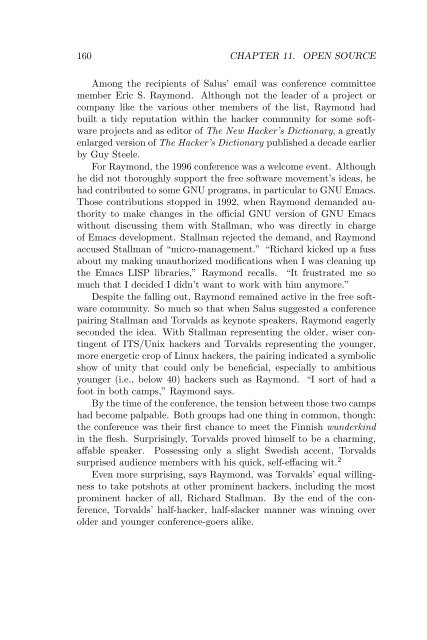Create successful ePaper yourself
Turn your PDF publications into a flip-book with our unique Google optimized e-Paper software.
160 CHAPTER 11. OPEN SOURCE<br />
Among the recipients of Salus’ email was conference committee<br />
member Eric S. Raymond. Although not the leader of a project or<br />
company like the various other members of the list, Raymond had<br />
built a tidy reputation within the hacker community for some software<br />
projects and as editor of The New Hacker’s Dictionary, a greatly<br />
enlarged version of The Hacker’s Dictionary published a decade earlier<br />
by Guy Steele.<br />
For Raymond, the 1996 conference was a welcome event. Although<br />
he did not thoroughly support the free software movement’s ideas, he<br />
had contributed to some GNU programs, in particular to GNU Emacs.<br />
Those contributions stopped in 1992, when Raymond demanded authority<br />
to make changes in the official GNU version of GNU Emacs<br />
without discussing them with Stallman, who was directly in charge<br />
of Emacs development. Stallman rejected the demand, and Raymond<br />
accused Stallman of “micro-management.” “Richard kicked up a fuss<br />
about my making unauthorized modifications when I was cleaning up<br />
the Emacs LISP libraries,” Raymond recalls. “It frustrated me so<br />
much that I decided I didn’t want to work with him anymore.”<br />
Despite the falling out, Raymond remained active in the free software<br />
community. So much so that when Salus suggested a conference<br />
pairing Stallman and Torvalds as keynote speakers, Raymond eagerly<br />
seconded the idea. With Stallman representing the older, wiser contingent<br />
of ITS/Unix hackers and Torvalds representing the younger,<br />
more energetic crop of Linux hackers, the pairing indicated a symbolic<br />
show of unity that could only be beneficial, especially to ambitious<br />
younger (i.e., below 40) hackers such as Raymond. “I sort of had a<br />
foot in both camps,” Raymond says.<br />
By the time of the conference, the tension between those two camps<br />
had become palpable. Both groups had one thing in common, though:<br />
the conference was their first chance to meet the Finnish wunderkind<br />
in the flesh. Surprisingly, Torvalds proved himself to be a charming,<br />
affable speaker. Possessing only a slight Swedish accent, Torvalds<br />
surprised audience members with his quick, self-effacing wit. 2<br />
Even more surprising, says Raymond, was Torvalds’ equal willingness<br />
to take potshots at other prominent hackers, including the most<br />
prominent hacker of all, Richard Stallman. By the end of the conference,<br />
Torvalds’ half-hacker, half-slacker manner was winning over<br />
older and younger conference-goers alike.


